In this article:
Kidney stone pain is so excruciating that it often leaves an indelible mark on your memory. Some women even liken it to the intense pain experienced while giving birth. In fact, the pain associated with passing a kidney stone can be so intense that it may land you in the emergency room.
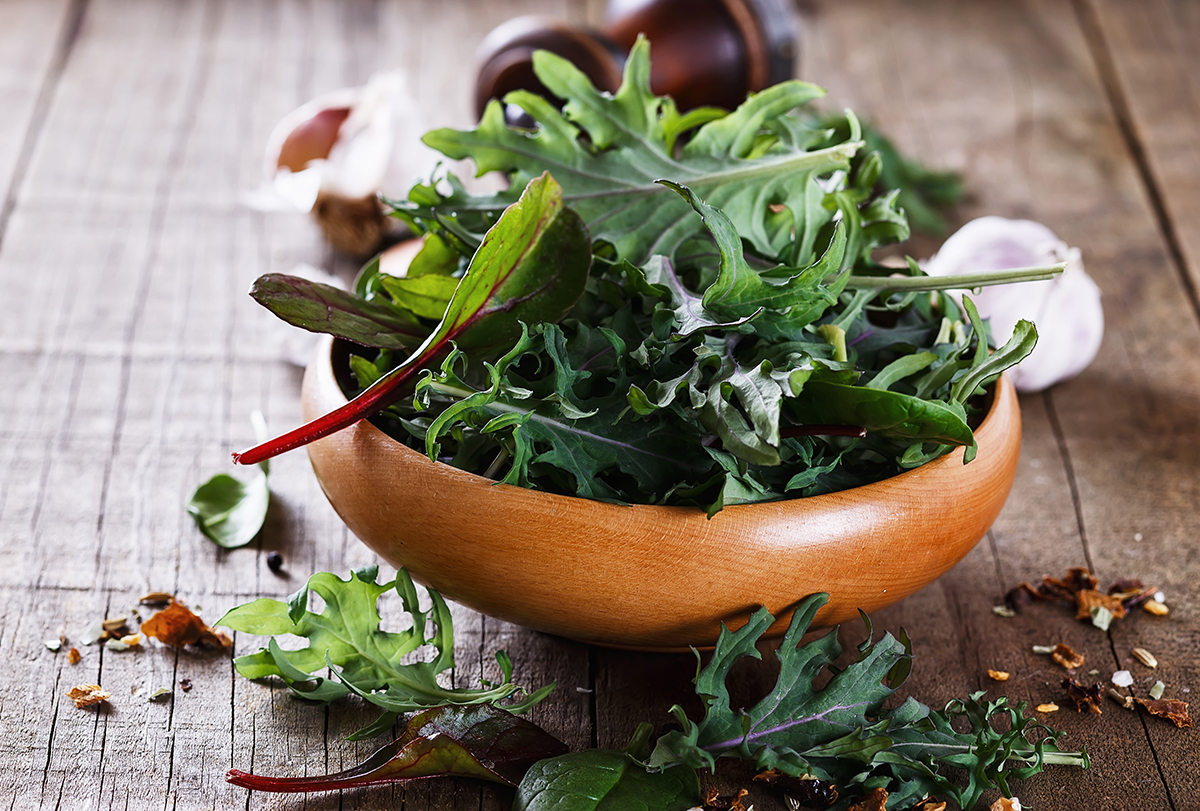
Kidney stones are essentially solid masses of minerals and salts that form inside one or both of your kidneys. They come in all sorts of shapes and sizes, ranging from as small as a grain of sand to as large as a golf ball.
According to the National Health and Nutrition Examination Survey (NHANES), kidney stones affect approximately 1 in 11 people in the US.
What’s worse is that people who have had a kidney stone once are likely to develop another within seven years, unless you actively work to prevent them.
Drinking plenty of water to dilute the stone-causing minerals and salts in the urine is an essential prerequisite for preventing this problem. Along with fluid intake, your food choices also can either precipitate or deter the formation of kidney stones.
Foods That Trigger Renal Stones
Diet is a key factor that is easily within your control. Eliminating certain foods from your diet can help prevent kidney stones and support the overall health of your kidneys.
Here are 9 foods that raise your odds of developing kidney stones.
1. Oxalate-rich foods
Kidney stones form due to a buildup of calcium oxalate, so eating oxalate-rich foods in high amounts can increase your risk. The oxalate found in urine combines with calcium to form calcium oxalate kidney stones. (1)(2)
People who are at a higher risk of developing kidney stones should eat oxalate-rich foods in moderation. This includes spinach, rhubarb, okra, beetroot, kale, celery, soy milk, strawberries, and Swiss chard.
Also, keep your vitamin C intake to appropriate levels. Extra vitamin C can cause oxalate stones.
2. Sardines
People who are at a higher risk of developing uric acid stones should avoid foods that are high in purines, such as sardines. A high intake of purine increases the amount of uric acid in the urine and can lead to uric acid stones. (3)(4)
Furthermore, purine-rich foods may trigger calcium oxalate stones by forming a nucleus for stone formation. Limit your intake of sardines to once or twice a week and keep a close eye on the portion size, too.
Other purine-rich foods that you should eat in moderation are anchovies, organ meats, bacon, scallops, shrimp, and baker’s yeast.
3. Red meat
Eating too much red meat, which is high in protein, can increase your risk of developing kidney stones. Excessive protein intake increases the amount of uric acid you produce and reduces the amount of stone-inhibiting chemical called citrate in the urine. (5)
A study published in the Journal of American Society of Nephrology found that consumption of a DASH-style diet (high intake of fruits, vegetables, nuts and legumes, low-fat dairy products, and whole grains and low intake of sodium, sweetened beverages, and red and processed meats) is associated with a marked decrease in kidney stone risk. (6)
Plus, the kidneys help metabolize and excrete nitrogen by-products from protein digestion. So, eating a high-protein diet increases the metabolic load on the kidneys. Avoid eating red meat on a daily basis. Instead, limit your intake to once or twice a week.
You may supplement your protein needs by consuming plant-based foods that are high in protein and low in oxalates, such as quinoa, lentils, tofu (bean curd), hummus, chia seeds, and Greek yogurt.
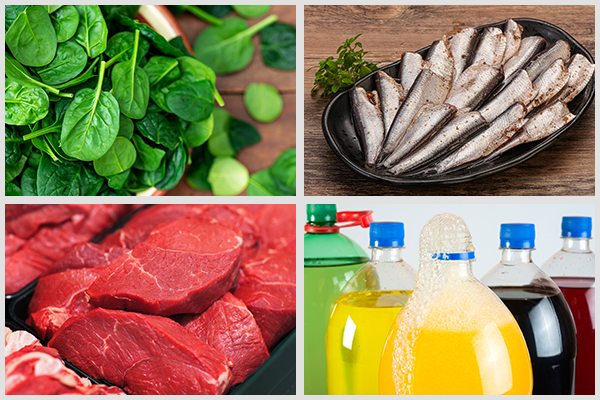
4. Carbonated drinks
Regularly drinking carbonated beverages, such as soda (with or without artificial sweeteners), energy drinks, and certain bottled juices, also increases the risk of developing kidney stones and kidney disease.
A 2007 study published in Epidemiology noted that cola beverages contain phosphoric acid that causes urinary changes and promotes kidney stones. It also increases the risk of chronic kidney disease. (7)
In addition, a 2013 study published in the Clinical Journal of the American Society of Nephrology noted that intake of sugar-sweetened soda and punch is associated with a higher risk of stone formation. (8)
Instead of drinking carbonated beverages, stick to plain water, flavored water, lemon water, or fresh orange juice.
5. Nonfermented soy
Soybeans and soy-based foods that are genetically modified are harmful to the body and can affect the health of your kidneys. They contain high levels of oxalates, which bind with calcium in the kidneys to form kidney stones. (9)
Plus, unfermented soy products like soy milk and tofu contain high levels of antinutrients including oxalates.
When buying soybeans, opt for organically grown varieties. Also, choose fermented soy products like miso and tempeh.
6. Refined carbohydrates
Refined carbohydrates (such as refined sugar, white rice, and refined flour) make the body produce high levels of insulin, which can cause calcium from the bones to end up in the urinary tract. (10)(11) This triggers the formation of calcium oxalate kidney stones.
In contrast, complex carbohydrates take much longer to digest and cause only a small, slow rise in blood glucose and insulin levels.
If you are at risk of developing kidney stones, avoid anything made with white or all-purpose flour.
7. Artificial sweeteners
Many of us use artificial sweeteners instead of sugar in our coffee or tea to cut calories. However, artificial sweeteners may impair kidney function if consumed on a regular basis. (12)
Plus, artificial sweeteners have a strong acid-forming effect on your blood. This increases the amount of calcium deposits in your body, which leads to the formation of large, calcium-based kidney stones.
Instead of artificial sweeteners, use honey or stevia to add a touch of sweetness to your coffee or tea.
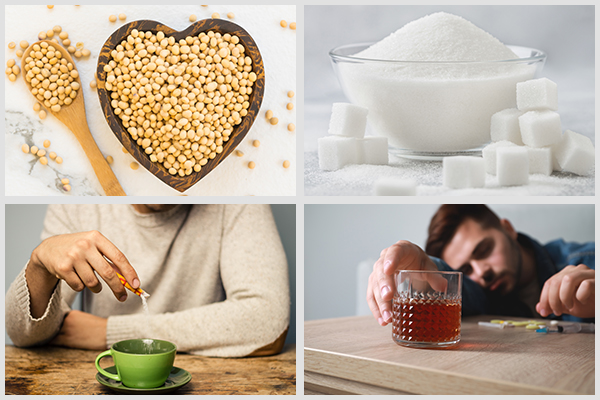
8. Excessive drinking
Drinking in moderation is fine, but drinking alcoholic beverages in excess can cause significant damage to your kidneys and liver.
Alcohol acts as a diuretic, which may lead to more urine production and increase your risk of dehydration. Dehydration disrupts normal kidney functioning. (13)
Plus, it may interfere with the body’s ability to excrete uric acid, which can lead to the formation of kidney stones.
In contrast, moderate consumption of alcohol may offer some protection against stone formation. Moderation means no more than two drinks per day for men and no more than one drink per day for women.
9. Table salt
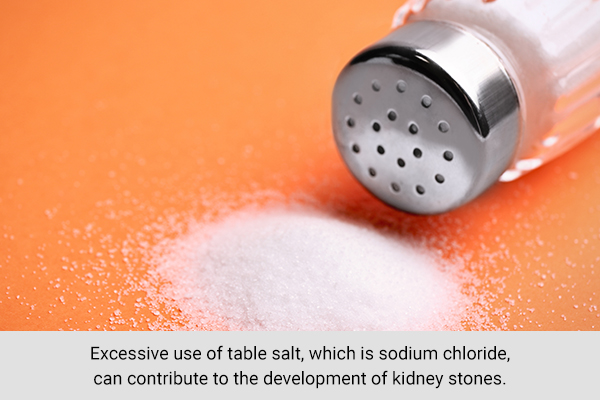
Excessive use of table salt, which is sodium chloride, can contribute to the development of kidney stones. High sodium intake encourages water retention and the kidneys are not able to flush out excess sodium from your body. It even increases calcium levels and reduces citrate (a stone inhibitor) levels in urine. (14)(15)
Furthermore, high sodium intake raises blood pressure, which can lead to heart disease, stroke, heart failure, and kidney disease.
If you are susceptible to calcium stones, limit your salt intake to less than 2 grams per day. Instead of regular table salt, use just a pinch of high-quality Celtic or Himalayan sea salt.
Also, use herbs and spices to add flavor to your food. In addition, avoid processed foods, which are usually high in sodium.
How Do Kidney Stones Form?
Our kidneys are tasked with the responsibility of filtering toxins, waste, and excess fluid from the blood to form urine.
When the kidneys contain an excess of certain types of chemicals, such as uric acid, phosphorous, calcium, and oxalic acid, and not enough fluid to dilute them, these minerals and waste substances get concentrated enough to form crystals.
Your kidneys may simultaneously run low on certain substances that prevent these crystals from sticking together. As a result, these clumps of waste material gradually grow in size to acquire the form of kidney stones.
The smaller stones are usually excreted without any medical intervention, rarely presenting any noticeable pain or symptoms. The larger ones, however, can get jammed in the narrow ureter and obstruct the natural flow of urine.
Given that your urinary tract is custom made for the passage of liquid matter, the expulsion of these solid rock-like masses can be mind-numbingly painful. (16)
Types of Kidney Stones
Kidney stones can be broadly categorized into calcium stones and non-calcium stones. Excessive calcium in the urine figures as the prime culprit for 80 percent of all kidney stones. It combines with one of two waste substances, oxalate or phosphorous, to give rise to different types of stones.
The most common types of kidney stones include the following: (17)
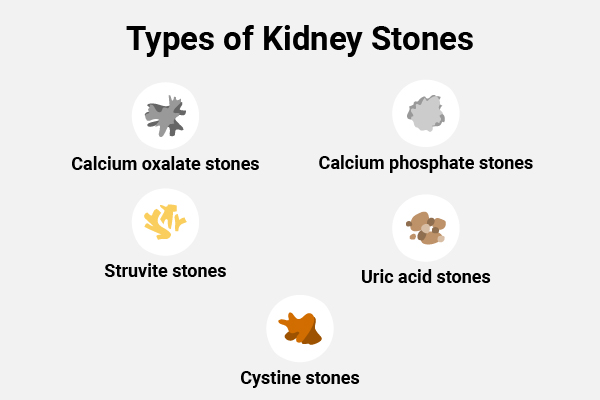
- Calcium oxalate stones: These are the most common type of kidney stones, which are formed when calcium binds with oxalate, a chemical that’s naturally found in many foods.
- Calcium phosphate stones: These are also quite prevalent and are formed when calcium binds with phosphoric acid.
- Struvite stones: These are often caused by an active urinary infection.
- Uric acid stones: These are often associated with diabetes and come into being when your urine is too acidic.
- Cystine stones: These result from a disorder called cystinuria, which is genetically passed down through families and is characterized by high levels of the amino acid cystine in the urine.
Different dietary factors can trigger the formation of different kinds of stones. Needless to say, there is no standard diet plan that applies to all kinds of stones.
Given that different stones have different nutritional contributors, there can never be a one-size-fits-all stone prevention diet. Each kidney stone calls for the elimination of specific foods and drinks that may contribute to its development.
If you are simply being careful and are looking to avoid all kinds of renal stones, try to steer clear of the following:
- High oxalate intake from certain foods that can result in calcium oxalate stones
- A high-protein diet, which is primarily responsible for calcium phosphate stones
- Too much sodium, a key factor in the development of uric acid and cystine stones
- Dehydration or low fluid intake
Tips to Avoid Kidney Stones
- Drink plenty of fluid, especially water. This is the most important thing you can do to lower your risk of getting another kidney stone. Aim for at least 2½ liters to 3 liters (10–12 cups) of fluid each day. People with cystine stones may want to aim for 4 liters (16 cups).
- It may be helpful to limit animal protein, including meat, fish, seafood, poultry, and eggs.
- Eat calcium-rich foods instead of taking supplements.
- If you want to take a vitamin C supplement, make sure you take less than 1000 milligrams per day. High amounts of vitamin C may increase your risk of stones.
Who’s at Higher Risk of Developing Renal Stones?
Factors that increase a person’s susceptibility to renal stones include:
- Family history of kidney stones
- Dehydration
- Being overweight
- Digestive diseases
- Urinary tract infections
- Eating a diet high in protein, sodium, and sugar
People who have had kidney stones in the past also exhibit a tendency for recurrent episodes.
Debunking the Major Kidney Stone Myths and Misconceptions
Here are some myths and misinformation about kidney stones that you need to know of.
Calcium is not the enemy
A lot of people make the mistake of shying away from calcium-rich foods in an effort to prevent kidney stones.
Given that calcium oxalate stones are the most commonly reported type of renal stones, it is natural for stone formers to have reservations about calcium-rich foods.
Many people attribute calcium as the major culprit and avoid taking a sufficient amount of calcium that is required for bone development and strength.
Quite the contrary, a high dietary intake of calcium can actually keep stones from forming by reducing the absorption of oxalates, a common compound present in many foods. You will also fare better by limiting your sodium intake, which promotes calcium buildup in urine.
Try to get your recommended fill of calcium through food sources rather than supplements. Your dietitian can stipulate the ideal amount of calcium for your particular age and case.
Giving up oxalates for good will fix the problem
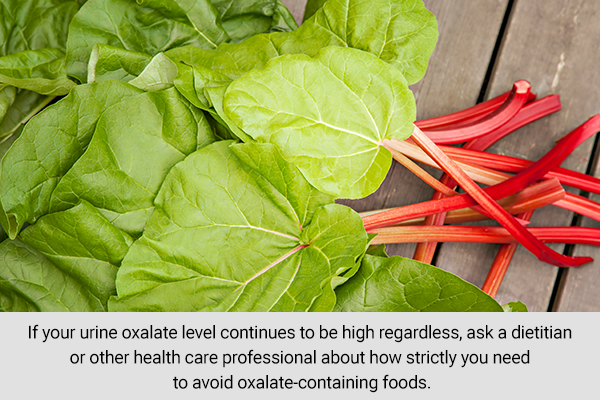
If you happen to be particularly susceptible to calcium oxalate stones, it may be a good idea to reduce your oxalate intake. However, there is a downside to this dietary recommendation that is often overlooked.
Many high-oxalate foods are also rich in fiber, magnesium, potassium, and phytate, all of which inhibit the occurrence of kidney stones. Thus, instead of avoiding such healthful sources of nutrients altogether, try to consume them in moderation.
Besides, some people are naturally better at absorbing oxalates than others, and thus such oxalate restrictive diets do not apply uniformly to all.
People with unfavorably high oxalate levels can naturally bring down the amount of oxalate absorption by consuming a high-calcium diet. If your urine oxalate level continues to be high regardless, ask a dietitian or other health care professional about how strictly you need to avoid oxalate-containing foods.
All in all, eliminating oxalate-rich foods from your diet alone will not prevent calcium oxalate kidney stones from forming and will only give you a false sense of security.
Research suggests that the best way to curb stone formation is to pair high-calcium foods with oxalate-rich ones during a meal. This allows the two to bind together in the stomach and intestines before the kidneys begin processing them, making it less likely that kidney stones will form.
Final Word
People who often get kidney stones should work with a dietitian to come up with a stone-preventive renal diet. Making the correct food choices is as much about what you should eat as it is about the foods to avoid.
A particular food that may contribute to the development of a particular kidney stone may have no significance for other kinds of stones. Thus, it is crucial to know exactly what type of kidney stone you are prone to in order to determine which foods to avoid.
The goal is to alter your diet to make it more kidney friendly, but not at the expense of your overall nourishment. What you should aspire for is an overall healthy and balanced diet, which doesn’t deprive you of any key food groups.
- Was this article helpful?
- YES, THANKS!NOT REALLY


